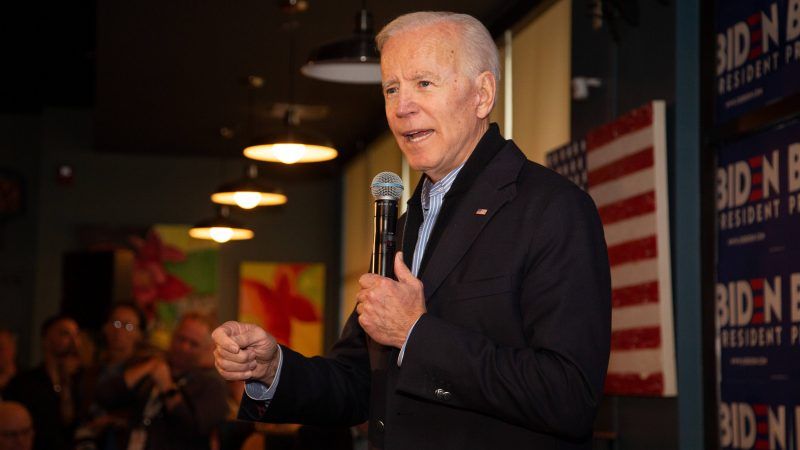Joe Biden Is Running Backwards Against Trump
Biden, like Trump, understands the potential political appeal of "used to be," the warm nostalgia in the hearts and minds of older voters about what they imagine America was before its supposed decline.

Joe Biden still has the big smile.
He's physically smaller, the same way that Bill Clinton is these days, the way that it's hard to tell whether it's because he's in better shape, or he's shrunken with age, or it's a combination of both.
Also like Bill Clinton, the hair has moved past gray into a color approaching white. At least Clinton, unlike Biden, has a full head of it still. If Donald Trump's orange tint can evoke the late Senator Strom Thurmond, Biden's locks, color-wise, are more like those of Senator Ernest "Fritz" Hollings, a Biden friend and colleague who died last month at age 97.
In the back of a Hampton, N.H., pizza joint where Biden is campaigning in front of a largely geriatric crowd, a campaign surrogate is telling a reporter that it's about what you'd expect for a midday, midweek event. I'd been to midday, midweek New Hampshire campaign events for Beto O'Rourke earlier this year, though, that drew younger crowds.
When Biden says Republicans are "going to try to eviscerate the social safety net, Medicare, Social Security," he's talking about programs that to many in the room aren't abstract future promises. He's wearing a cardigan sweater under his sport coat, as if someone is worried that he might catch a cold.
Biden, 76, is running a campaign that from a message standpoint echoes the one that Trump, 72, ran in 2016.
"I want to restore the soul of this country," Biden says, "rebuild the backbone of this country."
Restore, rebuild. The prefix "re" literally means "again," as in Trump's "Make America Great Again," as if Biden, like Trump, somehow wants to turn the clock back.
Even Biden's economic policy of tax increases gets a "re" frame; speaking of a plan for free community college, Biden says "we can pay for this with the tax cut that we are gonna reverse."
There "used to be a basic bargain," Biden says, in which employees shared in the prosperity.
Biden understands the potential political appeal of "used to be," the warm nostalgia in the hearts and minds of older voters about what they imagine America was before its supposed decline.
He also sounds like 2016-era Trump when he criticizes the economy on the grounds that "people are being left behind," talking about a closed General Motors assembly line in Delaware.
Biden talks about Warren Buffett complaining that he has a "lower tax rate than my secretary does." Buffett is 88, which explains why he has a "secretary" rather than voicemail or a personal assistant or executive assistant. The word "secretary" isn't much used anymore in the contemporary American workplace.
Biden talks about President Kennedy's speech about going to the moon, a speech delivered in 1962, saying his favorite part of it was Kennedy's phrase "we refuse to postpone." Actually, Kennedy called it a challenge "we are unwilling to postpone," but close enough.
"We have to end it now, this administration," is what Biden says he wanted not to postpone. Whether the analogy between the moonshot and ousting President Trump makes any sense or has any resonance will be up to the voters.
The moonshot reference is part of a kind of stream of consciousness tour of the policy highlights, or lowlights, of the past 60 years. "There is a whole lot of talk about Biden and the crime bill," Biden says, referring to himself in the third person, as Biden frequently does. "That's all Biden, midnight basketball."
That's a crime bill that passed in 1994, which was 25 years ago, before some of today's voters were born.
"I said back in 1987," Biden says at one point, during a discourse that also hits on the Civil Rights movement, Vietnam, the Iraq War.
The cameras in the back of the room are from C-Span and Fox News, but it's almost as if the whole thing belongs on the History Channel.
Biden's attraction to voters seems to be that they think he can win. "Maybe the country's just not ready for a woman," is the way Shirley Sylvester, 62, a retired project manager, put it to me.
As a presidential candidate in the 1988 cycle, Biden dropped out before the New Hampshire primary. As a presidential candidate in 2008, he finished sixth in the New Hampshire Democratic primary, behind Bill Richardson and Dennis Kucinich, with 0.22% of the votes. Not 22%, but 22 hundredths of a percent. This time around, he's got nowhere to go but up, at least New Hampshire-wise.
Perhaps the secret to progress is to cloak it, Trojan Horse-style, in conservative rhetoric. Or perhaps, for better or worse, there is something genuinely backward-looking about elements of Biden's program that want to undo the Reagan revolution and restore Johnson-era liberalism—"consensus," Biden called it, invoking a word historians use, somewhat controversially, to describe Cold War-era America.
Biden's path to victory requires being different enough from Trump to win the Democratic nomination while simultaneously being similar enough to Trump to win a general election. If not, it could be time to dust off some other "re" words—a repeat of Reagan's 1984 reelection, with Biden reprising the role of Walter Mondale.
Ira Stoll is editor of FutureOfCapitalism.com and author of JFK, Conservative.


Show Comments (84)